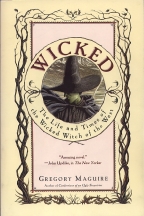Wicked: The Life and Times of the Wicked Witch of the
West
Regan Books / Harper Collins
US Trade Paperback
ISBN 0-060-98710-3
Publication Date: 10-15-1995
409 Pages; $15.00
Date Reviewed: 11-03-03
Reviewed by: Rick Kleffel © 2003
|

|
|
REFERENCES
|
COLUMNS
|
|
Fantasy,
General
Fiction
|
11-08-03
|
My earliest memories of movie-induced terror torment me with
images of flying monkeys and a green-skinned witch. As a result, I've
never watched the 'The Wizard of Oz'. Even as an adult I've managed
to miss it; no room in my world for childish things, even if they're
the stuff of cinema classics. So it's no surprise that I missed
'Wicked: The Life and Times of the Wicked Witch of the West' by
author Gregory Maguire the first time round. Fortunately for my
reading life, times have changed, and while I still haven't seen 'The
Wizard of Oz' -- so few have seen him -- I've just finished the
tremendously enjoyable meta-fictional update from author Gregory
Maguire. He has neatly done what I thought could never be done; stir
my interest in the relentlessly over-exposed movie and series of
books by L. Frank Baum. But frankly, those will take a back seat to
Maguire's own fiction. This fantasy works so well, on so many levels,
it's hard to know who first to buy the extra copies for. Maguire
embeds political intrigue, social commentary and a wonderfully
detailed character study in a surprisingly down-to-earth fantasy.
Good grows from evil deeds and evil springs from good intentions.
'Wicked' turns what you know upside-down. What you don't know falls
squirming into the light.
'Wicked' is true to its entire title; it encompasses the life and
times of the woman who comes to be known as 'The Wicked Witch of the
West' in the world of L. Frank Baum's Oz. It starts on the day of her
birth and ends on the day of her death. What comes between is simply
one of the most captivating bits of fantasy character detail readers
are likely to find. Born with green skin and sharp teeth, Elphaba
isn't a well-liked child. While her randy mother Melena remains at
home, her father the stolidly religious Frex tilts at the misdeeds of
a mostly poor bunch of peasants. But Elphaba is smart, and as she
grows her intellect helps her deal with the problems of being green.
But she doesn't just strike out against the injustice in her own
life. With the arrival of the mysterious and autocratic Wizard in the
Land of Oz, society begins to unravel. The rich are pitted against
the poor and laws are enacted to prevent popular protest. None of
this sits well with Elphaba, who is determined to do something about
it.
Maguire's success in this novel rests on his ability to create a
detailed, believable world populated with detailed, believable
characters. Maguire's Oz is a political animal, populated by
political Animals, beasts with intelligence and the ability to speak,
as well as animals, who are either simply silent, or simply beasts.
How do you tell? They're the first targets of a vicious pogrom by the
Wizard, and Elphaba's reaction to their treatment leads her down a
path that would today be called terrorism. In the years intervening
since Maguire wrote his novel, the themes he discusses -- the nature
of activism as potentially both good and evil, simultaneously, the
nature of conspiracy and its counterpart paranoia, the nature of
humanity as something outside the human form -- have become even more
compelling. When Maguire infects the Emerald City with random
killings and public bombings, he does so from within the point of
view of the so-called terrorist, but makes life on both sides of the
coin compellingly clear. You'll find more clear-headed political
thinking in this fantasy than you will in most conventions.
But the real appeal of this novel lies in the characters. Elphaba
is unraveled carefully, with each event perfectly pitched to help
drive her to the depths she will achieve. As she becomes more twisted
and tweaked, the reader's sympathy increases, because we know where
she's been, both emotionally and politically. But Maguire also makes
sure to give his other characters the proper shadings and details;
Galinda, who becomes Glinda, is a dizzy socialite, while Elphaba's
sister, Nessarose, suffers from an infirmity that should be even more
debilitating than Elphaba's. In particular, Maguire does a wonderful
job at creating Elphaba's college years in the city of Shiz. It's
here that they all encounter immortal icons amidst the universal
challenges of adolescence. And it's here that their lives begin to
drain away towards their inevitable destinies.
Maguire does an admirable job of playing down the placement of the
most memorable aspects of Oz as they pop up in his narrative. They're
each built up slowly and subtly, from the flying monkeys to the
compellingly beautiful shoes. The denouement turns Dorothy's triumph
into Elphaba's tragedy, and the readers will be turning the pages to
get there. The accelerated pace may leave the reader feeling that the
fantasy has worn a bit thin, but this is primarily a journey of
understanding, not arrival. You all know the goal; you will be
wicked, you will be dead. But it's what you do on your way there that
distinguishes you from the Animals, from the animals, from the
monkeys. They'll fly and be free. Your fate may not be so kind.
